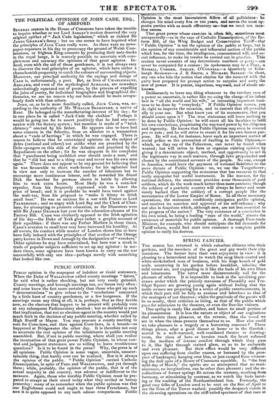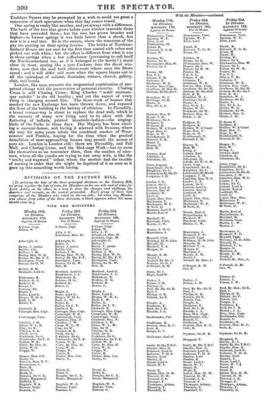SPRING FANCIES.
THE season has returned in which suburban citizens trim their gardens, and the members of the great and gay world their city mansions. The former have their own enjoyment in view : it is pleasing to a benevolent mind to watch the snug black-coated and white-neckclothed man of business, with his huge bunch of gold seals, sauntering in his garden before breakfast, inhaling the mild vernal air, and expanding in it like the buds of his own lilacs and laburnums. The latter more disinterestedly toil for the pleasure of others. It is impossible to look at the scrubbing pro- cesses under which the princely mansions of Piccadilly and Tra- falgar Square are growing young again without feeling that the noble owners are preparing tbr a series of public entertainments, in which their part will be fully as anxious and laborious as that of the managers of our theatres; whilst the gratitude of the guests will be as scanty, their criticism as biting, as that of the public which pay s for admission to the theatres, or even the free-list visiters.
One spring is vastly like another, and hence no small portion of its pleasantness. It is less the nature or object of our cogitations that renders them pleasant, or the reverse, than the mood we are in when the ideas present themselves to us. How else could we take pleasure in a tragedy or a harrowing romance ? These things please, after a good 'dinner at home or in the Garrick : seated in a well-warmed, well-ventilated theatre or drawing- room, the vices of hero or heroine reach the heart softened by the medium of intense comfort through which they pass to it, like light through stained glass, so as to be endurable and even pleasant. But their effect would be very different upon one suffering from similar causes, or harassed by the pros- pect of bankruptcy hanging over him, or just escaped from witness- ing the dull spite of a House of Commons squabble. In " the first mild day of March," the spirits are so attempered that no remi- niscences, no imaginations, can be other than pleasant ; and the re- collections of former springs flit across the memory, soothing from harmony, or stimulating by contrast, as we watch the buds burst- ing or the washing of the Northumberland lion. Formerly, the good easy folks of London used to be sent on the first of April to see the lions of the 'rower washed: possibly the despatch visible in the cleansing operations on the stiff-tailed specimen of that race at Trafalgar Square may be prompted by a wish to avoid too great a concourse of such spectators when that day comes round. One spring is vastly like another, and yet always with a difference. The buds of the tree that grows before your window resemble those that have preceded them ; but the tree has grown broader and higher—in former springs it was little better than a shrub, but now it is a real tree. So in the streets, where the mansions of the gay are putting on their spring liveries. The bricks of Northum- berland House are not now for the first time coated with ochre and picked out with white; but the effect is different from what it was in those springs when a low coffeehouse (presuming to call itself the Northumberland too, as if it belonged to the family ! ) stood close in front, staring like a pert Cockney into the ducal win- dows, now that the soul hath elbow-room where once the Mews stood ; and it will differ still more when the square blazes out in all the splendour of column, fountains, statues, church, gallery, club, and hotels. London, like man, presents the enigmatical combination of per- petual change with the preservation of personal identity. Charing Cross is still Charing Cross; King Charles " sedet eternum- que sedebit" in the old locality ; and yet the aspect of every thing is changing around him. The horn-work of houses that masked the new Exchange has been thrown down, and exposed the front of the building to the battery of criticism. In Piccadilly, a broad terrace•way is about to replace the dead wall, which in the memory of many now living used to he alive with the fluttering of ballads, printed broadside-fashion---the singing- birds of the Parks in those days. Her Majesty has been erect- ing a summer-house, and having it adorned with frescoes, where she may for some years inhale the combined smokes of West- minster and Pimlico, hoping for the time when the gradual demolition of near-approaching houses may permit the access of pure air. London is London still : there are Piccadilly, and Pall Mall, and Charing Cross, and the Bird-cage Walk—but no more like themselves as we remember them, than the maiden of nine- teen, whom all the youths are trying to run away with, is like the " tetchy and wayward" infant, whom the mother bad the trouble of nursing in order that she might be deprived of it as soon as it grew up into something worth having.



























 Previous page
Previous page